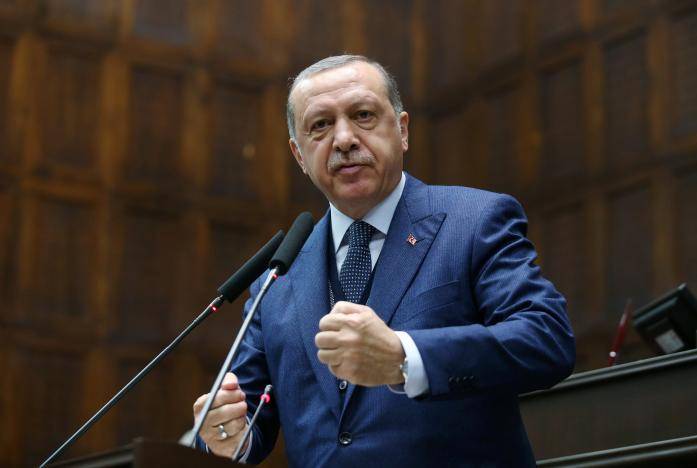Ankara (Reuters): Turkish President Tayyip Erdogan denounced the isolation of Qatar by neighboring states as a violation of Islamic values and akin to a “death penalty” imposed on Doha in a crisis that has reverberated across the Middle East and beyond.
Erdogan's comments marked the strongest intervention yet by a powerful regional ally of Doha eight days after Saudi Arabia, the United Arab Emirates (UAE), Bahrain and Egypt cut ties with Qatar and imposed stringent economic sanctions on it.
Qatar denies their accusations that it supports Islamist militants and Shi'ite Iran, arch regional foe of the Sunni Gulf Arab monarchies.
"A very grave mistake is being made in Qatar, isolating a nation in all areas is inhumane and against Islamic values. It's as if a death penalty decision has been taken for Qatar," Erdogan told members of his ruling AK Party in Ankara.
"Qatar has shown the most decisive stance against the terrorist organization Islamic State alongside Turkey. Victimizing Qatar through smear campaigns serves no purpose."
The measures against Qatar, a small oil and gas exporter with a population of 2.7 million people, have disrupted imports of food and other materials and caused some foreign banks to scale back business.
Qatar, which imported 80 percent of its food from bigger Gulf Arab neighbors before the diplomatic shutdown, has been talking to Iran and Turkey to secure food and water.
Turkey has maintained good relations with the world's second largest helium producer as well as several of its Gulf Arab neighbors. Turkey and Qatar have both provided support for the Muslim Brotherhood in Egypt and backed rebels fighting to overthrow Syrian President Bashar al-Assad.
Iraqi Prime Minister Haider al-Abadi also criticized the measures imposed on Qatar, saying in Baghdad on Tuesday they were hurting the emirate's people, not its rulers.
Gulf Arab states have issued no public demands to Qatar, but a list that has been circulating includes severing diplomatic ties with Iran, expulsion of all members of the Palestinian Hamas group and the Muslim Brotherhood, the freezing of all bank accounts of Hamas members, ending support for "terrorist organizations" and ending interference in Egyptian affairs.
Some analysts say demands could also include closing down satellite channel Al Jazeera, or changing its editorial policy.
Saudi Arabia's foreign minister struck a slightly softer line in comments to reporters during a joint news conference in Washington with US Secretary of State Rex Tillerson, saying Riyadh was ready to send food and medical supplies to Qatar.
The minister, Adel al-Jubeir, defended the Arab powers' move against Qatar as a boycott, not a blockade, adding: "We have allowed the movement of families between the two countries to happen so that we don’t divide families."
However, the UAE envoy to Washington, Yousef al Otaiba, reiterated the accusations that Qatar was supporting terrorism.
"Doha has become a financial, media and ideological hub for extremism. Then it must take decisive action to deal once and for all with its extremist problem," he wrote in an opinion piece for the Wall Street Journal.
There has been no breakthrough in Kuwaiti efforts to mediate in the crisis, but a US official in the region said Kuwait was continuing with what is seen as a "slow, painstaking, deliberate" process focused inside the GCC.
"The parties are still defining what it is they want out of this confrontation ... It's difficult to conduct negotiations if you don't really know what everybody wants."
Qatari Foreign Minister Sheikh Abdulrahman al-Thani said on Monday Doha "still had no clue" why Arab states had cut ties with his country. He denied Doha supported groups like the Muslim Brotherhood that its neighbors oppose, or had warm ties with their enemy Iran.
Turkish Foreign Minister Mevlut Cavusoglu said Erdogan would discuss the Gulf rift in a telephone call with US President Donald Trump in coming days, but gave no specific time.
Turkey last week approved plans to deploy more troops to a military base it has established in Qatar under a 2014 agreement with the Gulf Arab state. The move was seen as support by regional power and NATO member Turkey to Doha.
The Chairman of the US Joint Chiefs of Staff, Joseph Dunford, told a Senate hearing that the rift between Qatar and its neighbors was not affecting US military operations.
Al Udeid Air Base in Qatar is home to more than 11,000 US and coalition forces and an important base for the fight against Islamic State militants in the region.
In Moscow, the Kremlin said President Vladimir Putin and Saudi Arabia's King Salman discussed the Qatar crisis in a phone call on Tuesday. The Kremlin said that the row was not helping to unite efforts to try to find a Syria settlement or fight terrorism.
Morocco has also waded into the crisis, announcing it was sending plane-loads of food supplies to Doha as part of its religious duty during the holy Muslim month of Ramadan.
So far, the measures against Qatar do not seem to have caused serious shortages of supplies in shops.
Some people have even joked about being "blockaded" inside the world's richest country: a Twitter page called "Doha under siege" pokes fun at the prospect of readying "escape yachts", stocking up on caviar and trading Rolex watches for espresso.
But an economic downturn could have more dire consequences for the vast majority of Qatar's residents, who are not citizens but foreign workers.
Migrant laborers make up 90 percent of Qatar's population, mostly unskilled and dependent on construction projects such as building stadiums for the 2022 soccer World Cup.


